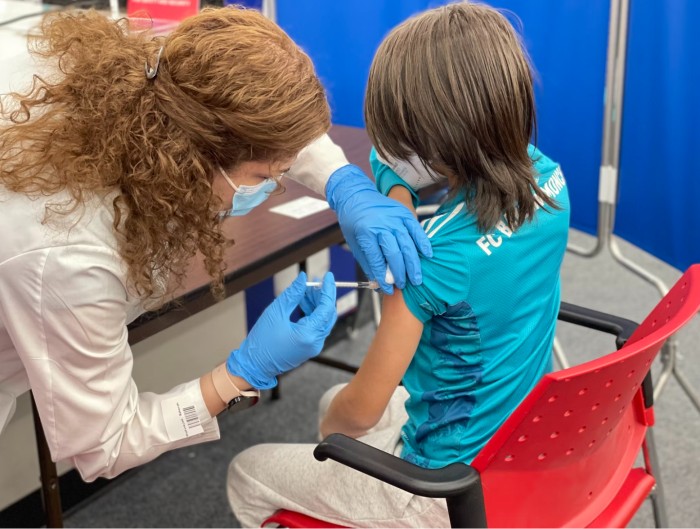IMANA NEWS
All You Need to Know About COVID-19 Vaccines for Kids Under 5
15 July 2022
Vaccines are one of the most important ways to protect children from serious, life-threatening diseases. A common talking point throughout the pandemic has been the safety of administering experimental vaccines to young children with vulnerable immune systems.

This guide outlines all you need to know about vaccines for kids under 5.
Are There COVID-19 Vaccines Authorized for Young Children?
The FDA has authorized two COVID-19 vaccines for infants as young as six months: Moderna and Pfizer-BioNTech. These vaccines have been tested in clinical trials, and both have been proven safe and effective in preventing the spread of the virus.
Moderna is a preventative vaccine that contains one strain of COVID-19, while Pfizer-BioNTech is an active immunity vaccine that contains multiple strains of the virus. Both are administered via intramuscular injection, which means they must be administered by a medical professional, either through a visit to the doctor’s office, clinic, or designated vaccine locations.
In the wake of the COVID-19 pandemic, vaccines have been authorized for use in children as young as six months. The vaccines are approved under emergency use authorization, which allows them to be used under extraordinary circumstances such as a worldwide pandemic.
Why Did the FDA Approve the Pfizer Vaccine for Young Children?
The FDA has approved Pfizer’s COVID-19 vaccines for young children, a decision made after months of rigorous review of safety, efficacy, and production data.
FDA Commissioner Robert M. Califf said that these vaccines are expected to protect young children against the worst effects of COVID-19, such as hospitalization and death, as previously observed with older age groups.
According to the Commissioner, the Pfizer-BioNTech COVID-19 vaccines have been made available to the pediatric population because the known and prospective benefits outweigh the known and possible dangers.
In addition, the FDA’s independent Vaccines and Related Biological Products Advisory Committee voted in favor of licensing these vaccines for the pediatric population before making their decision official.
COVID-19 Vaccine Side Effects
The COVID-19 vaccine has been distributed across the United States and worldwide to prevent the spread of the disease. Over a year after the rollout began, the possible side effects in adults and older children have been well-documented.
The CDC has confirmed that side effects from the vaccine are generally mild and temporary, including soreness at the injection site, a mild rash, and a low-grade fever that lasts less than 24 hours. The CDC also said these symptoms should resolve within one week after vaccination.
A small percentage of the population has reported experiencing more severe side effects, including seizures and Guillain-Barré syndrome (GBS).
In response to these concerns, the CDC stated in 2021 that “no causal link has been established between GBS and Vaccinia Virus (VACV) or any other vaccine.”
What Should Parents Take Into Account Before Vaccinating Their Children?
Parents often have a lot of questions about vaccinations. They may wonder if their child’s immune system is strong enough to handle inoculation or if they are too young to get vaccinated.
They may also be concerned about the vaccine’s effect on their child’s body and whether they should avoid certain types of vaccines altogether.
While these questions can be challenging to answer, there are some things parents can take into account before vaccinating their children. First and foremost, they need to remember that vaccines are safe for most children. UNICEF estimates that vaccines prevent nearly 2 million deaths every year.
The next thing parents should consider is their child’s history of vaccines. If they have no history of adverse reactions from previous vaccinations, there is no reason not to vaccinate them against COVID-19, the flu, and other diseases as soon as possible.
How Do Child Vaccinations Impact the State of the Pandemic?
Vaccines for kids under 5 is a hot topic. It is crucial to understand how they can affect the pandemic and what might happen if they are not administered to the target percentage of the population.
COVID-19 is still raging in many parts of the world, and millions of children have been infected. Vaccination will significantly reduce the risk of severe symptoms, hospitalization, and death due to the virus. The FDA and CDC’s unanimous recommendations do not come lightly—they were made after months of studies.
With vaccines available to the vast majority of the population, children no longer have to spend days on end isolated at home.
If you are concerned about the vaccine’s potential side effects, talk with your pediatrician about whether or not you should get your child vaccinated against COVID-19 before making a decision.